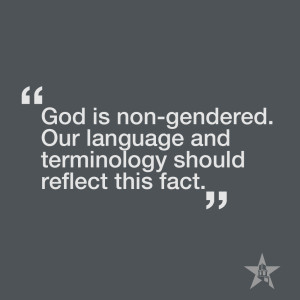Houghton College’s doctrinal statement asserts, “We believe that there is one God, eternally existing in three persons: Father, Son, and Holy Spirit.” Many people, including myself, recognize the unfortunate terminology used in this statement and here is why. In our present world many, sadly not all, people recognize the importance of gender-inclusive language. Why does our college not? When referring to God, instead of saying, “Father” our language should be inclusive, perhaps using words such as “Maker” or “Creator.”
 Many of you reading this article may strongly disagree with this opinion. Others may agree, but ask, Why is gender inclusive language so important?
Many of you reading this article may strongly disagree with this opinion. Others may agree, but ask, Why is gender inclusive language so important?
First, God is not male. The bearded white man in the clouds is just an image from your picture book bible. Throughout the bible numerous references to God as male and God as female are made.
For example, in a recent workshop at the college, Sarah Derck, professor of Old Testament, mentioned the Hebrew word “Shaddai” which is used 48 times in the Old Testament. Since the 1930s etymological and linguistic research done has found convincing reason to think that “Shaddai” has been falsely translated in the past.
Traditionally, the word has been translated as “Almighty” or “God Almighty” but with further research, scholars have found that “Shaddai” is from a different Akkadian root word signifying the word ‘breast,’ Derck stated, “Theologically, the significance is an astounding reference to the nourishment and nurture of God signified by female anatomy, as part of the range of metaphors used for God.” Metaphorical language and imagery fills Scripture. Biblical language references God with both male and female terminology- neither is literal.
Personally, though I grew up in an egalitarian home, I was still under the misconception of God as male. At church I was always told of God the male shepherd looking for his lost sheep (Luke 15:1-7). However, I never read a children’s book or had a single Sunday school class centered on the very next parable in the gospel of Luke. The first verse of this parable: “Or suppose a woman has ten silver coins and loses one. Doesn’t she light a lamp, sweep the house and search carefully until she finds it?” (Luke 15: 8 NIV). The shepherd and the woman serve the same purpose: comprehensive metaphorical language representing God’s love for humanity.
Now onto the question: “Why should one care if God is referred to as male?”
The answer seems obvious: using inclusive language includes everyone. In her book, The Second Sex, Simone de Beauvoir discusses the detrimental effects of having men be viewed as the norm in society. De Beauvoir writes, “A man never begins by presenting himself as an individual of a certain sex; it goes without saying that he is a man.” In society, men have historically been seen as the ‘Absolute’ or ‘norm.’ More particularly, in American history, white men have been seen as the Absolute, while minority races and women have been the derivative from the norm: in de Beauvoir’s words “He is the Subject, he is the Absolute- she is the Other.” If female is the Other, she then feels that in order to validate her own capabilities and be part of the ‘norm’ she must conform to the Absolute or ‘male.’
 When God is repeatedly referred to as ‘male,’ women feel as if they are the Other and men are the Absolute. In relation to biblical language, Kristina Lacelle-Peterson, professor of religion, stated, “Given that Scripture depicts God sometimes with feminine imagery and God as the one over everything in whose image we are mad, male and female, it is a huge reduction of God to assume God is male.”
When God is repeatedly referred to as ‘male,’ women feel as if they are the Other and men are the Absolute. In relation to biblical language, Kristina Lacelle-Peterson, professor of religion, stated, “Given that Scripture depicts God sometimes with feminine imagery and God as the one over everything in whose image we are mad, male and female, it is a huge reduction of God to assume God is male.”
Not only are we reducing our view of God when we say ‘male’, we are also ordaining men with inherent God-like qualities, which are denied to women. This type of thinking then encourages the harmful image of men as sole ‘master,’ ‘provider,’ ‘spiritual leader’ the list goes on and on. Women are more than capable of leadership roles and this includes spiritual life leadership. The false view of God as ‘male’ perpetuates the unhealthy view of male as pre-ordained leader.
Through advocacy for gender-inclusive language I am stressing the reality that all people, male and female, are made in God’s image. God is non-gendered and our language and terminology should reflect this fact. Our college’s spiritual life, academic life, and all other facets should support equality and inclusion by adhering to gender-inclusive language.

AWOMAN!
I agree that God is not gendered and has qualities of male and female, but my question is: Doesn’t God choosing to conceive Jesus as a “son” automatically set the tone for a view of God as male?